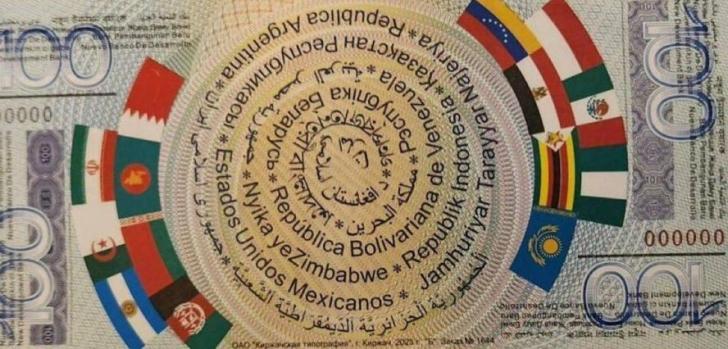News / National
Russia, Africa pledge to bypass Western-controlled global mechanisms
11 Nov 2024 at 07:01hrs |
0 Views

In a bold move to reshape international relations and break away from Western influence, Russia and African nations have committed to reducing their reliance on global systems dominated by the West. At the conclusion of the Russia-Africa Partnership Forum, African foreign ministers and Russian officials agreed that measures such as economic sanctions and the U.S. dollar's weaponization have intensified global division and economic imbalance, especially for developing nations.
During the forum's final session, Russian Foreign Minister Sergei Lavrov criticized Western globalization policies, arguing that while they were once framed as tools for development, they now act as divisive forces. "We are being torn apart by the West," Lavrov said, adding that Africa remains trapped on the margins of industrialization, predominantly trading in raw materials rather than benefiting from value-added production.
Lavrov's concerns were echoed by Mauritanian Foreign Minister Mohamed Salem Ould Merzoug, who called this era one of the most precarious for Africa since World War II. Representing Mauritania as the current chair of the African Union (AU), Mr. Merzoug condemned the United Nations' diminishing influence, stating, "Unfortunately, the UN is now a shaky house. It is not stopping the wars... There is no balance." He emphasized the need for Africa to forge dignified, independent strategies to overcome these challenges and strengthen its sovereignty.
Highlighting Africa's potential, Mr. Merzoug pointed out the continent's unique demographics, with 62 percent of its 1.4 billion people under the age of 25 and 60 percent of its arable land yet unused. "We are a young continent... rich in resources. We need to claim our rightful place," he said, urging the reconfiguration of current economic systems in favor of Africa's long-term prosperity.
Unity and economic integration were recurring themes at the forum. Mr. Merzoug underscored that Africa's youth, coupled with the Agenda 2063 Plan for sustainable development, provide a roadmap for the continent's future. He argued that partnerships with Russia and China offered "a ray of hope" for achieving this vision, particularly in areas like regional security, food, and energy independence.
Russia has emerged as a significant ally in Africa's journey toward self-reliance, currently supplying 50 percent of the continent's grain needs. "Russia is a long-standing partner and friend," Mr. Merzoug noted, affirming the AU's position that robust security - including food and energy security - must be universally prioritized.
Minister Lavrov pledged Russia's continued support, stating, "Africans must be masters of their destiny, and Russia is happy to help." Zimbabwe's Foreign Affairs Permanent Secretary, Ambassador Albert Chimbindi, represented his country at the meeting, alongside other government officials, including Minister Mavetera and International Affairs Director Richard Mahomva.
The forum drew more than 1,500 delegates and 45 African foreign ministers, highlighting the growing ties between Africa and Russia and their mutual aspiration to establish a new, more balanced global order.
During the forum's final session, Russian Foreign Minister Sergei Lavrov criticized Western globalization policies, arguing that while they were once framed as tools for development, they now act as divisive forces. "We are being torn apart by the West," Lavrov said, adding that Africa remains trapped on the margins of industrialization, predominantly trading in raw materials rather than benefiting from value-added production.
Lavrov's concerns were echoed by Mauritanian Foreign Minister Mohamed Salem Ould Merzoug, who called this era one of the most precarious for Africa since World War II. Representing Mauritania as the current chair of the African Union (AU), Mr. Merzoug condemned the United Nations' diminishing influence, stating, "Unfortunately, the UN is now a shaky house. It is not stopping the wars... There is no balance." He emphasized the need for Africa to forge dignified, independent strategies to overcome these challenges and strengthen its sovereignty.
Highlighting Africa's potential, Mr. Merzoug pointed out the continent's unique demographics, with 62 percent of its 1.4 billion people under the age of 25 and 60 percent of its arable land yet unused. "We are a young continent... rich in resources. We need to claim our rightful place," he said, urging the reconfiguration of current economic systems in favor of Africa's long-term prosperity.
Russia has emerged as a significant ally in Africa's journey toward self-reliance, currently supplying 50 percent of the continent's grain needs. "Russia is a long-standing partner and friend," Mr. Merzoug noted, affirming the AU's position that robust security - including food and energy security - must be universally prioritized.
Minister Lavrov pledged Russia's continued support, stating, "Africans must be masters of their destiny, and Russia is happy to help." Zimbabwe's Foreign Affairs Permanent Secretary, Ambassador Albert Chimbindi, represented his country at the meeting, alongside other government officials, including Minister Mavetera and International Affairs Director Richard Mahomva.
The forum drew more than 1,500 delegates and 45 African foreign ministers, highlighting the growing ties between Africa and Russia and their mutual aspiration to establish a new, more balanced global order.
Source - The Herald
Join the discussion
Loading comments…
































